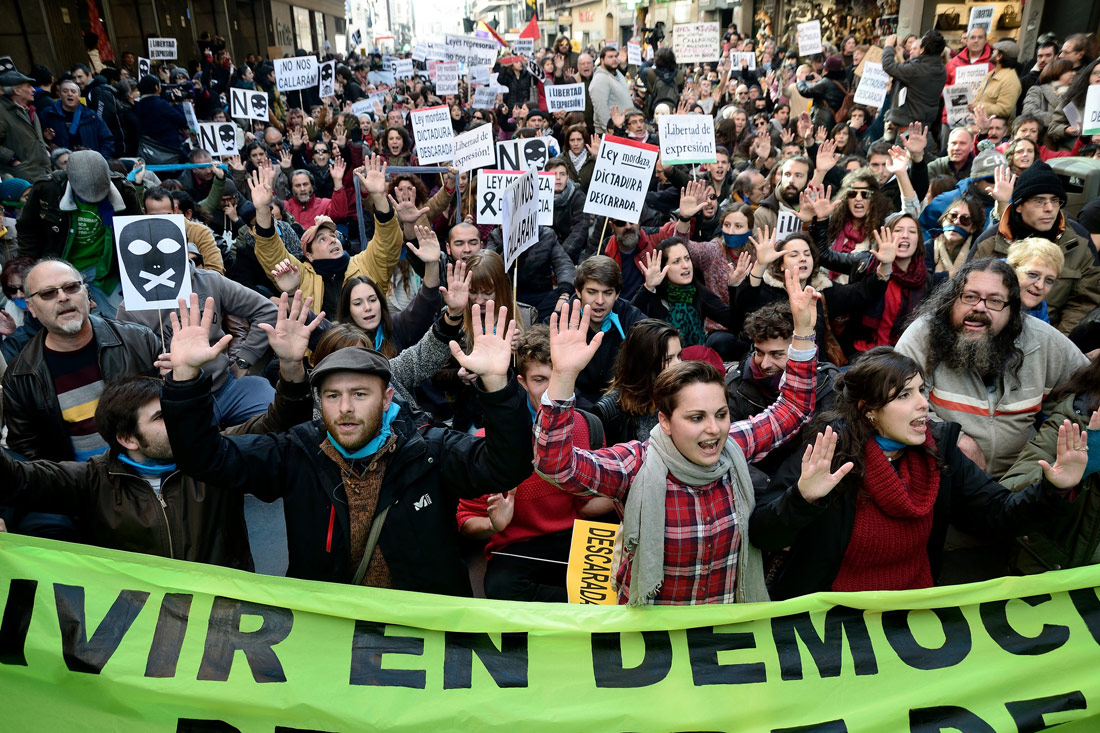
Birds in their cages, China | DaiLuo | CC BY
For over two decades, new technologies have been turning into indispensable tools for any process of social change. For this reason, governments worldwide are taking an increasingly tougher stance with measures to control them, whether by censoring contents, closing down platforms or directly persecuting users. Authoritarian regimes also harass the political opposition via the Internet; in democracies, while representative democracies are applying pressure to increase surveillance under the threat of terrorism. Spain presents a particular formula of its own, with highly controversial management of dissidence in the name of security.
From the Zapatista National Liberation Army (EZLN) to Edward Snowden, activists making use of the communication and information networks have ceased to be an exceptional phenomenon and are now common currency. This is obvious in the light of the increasingly strict control that governments worldwide are exercising over the Internet and new technologies. According to the report ‘Freedom on the Net 2016’, produced by non-governmental organisation Freedom House, some 67% of Internet users live in countries where criticising the authorities may be a cause of censorship. Based on data extracted from 65 states between June 2015 and May 2016, the organisation alerts that online freedom has declined for the sixth year running, with more governments than ever keeping tabs on what is said on the social media networks and banning certain apps to prevent the circulation of information, especially during periods of anti-government revolts.
Shooting the messenger. The pressure on tools
Following the electoral protests in Iran in 2009 and the subsequent revolts of the Arab Spring, analysts and the media popularised the idea of “Twitter revolutions” or “Facebook revolutions”. Barely eight years later, these social networks have ceased to be the main core for organising political dissidence, and today journalists and activists in many countries have turned to instant messaging tools, which are more private and secure, in order to avoid governmental control.
The pressure on encrypted messaging services such as WhatsApp and Telegram has increased under authoritarian and democratic governments alike; under the latter as part of the fight against terrorism. Out of 65 countries evaluated by Freedom House, 24 have at some point in the last year prevented access to social networks and other communication tools, nine more than in 2015. At times of political upheaval, 15 governments have even gone so far as to block all connection to the Internet in order to prevent the dissemination of information, a practice that attracted attention in Egypt in 2011 but that ins increasingly frequent, as in the Ethiopia protests of October 2016.

Demonstration against the “Gag Law”. Madrid, 2014 | Adolfo Lujan | CC BY-NC-ND
Using less drastic measures, western democracies continue applying pressure to oblige manufacturers and telecommunications operators to hand over private data in order to fight against terrorism, as exemplified by the requests of France and Germany to the European Commission, or the encryption dispute maintained by the United States with Apple as a consequence of the San Bernardino attack in late 2015.
Severe penalties for users
Beyond the measures against channels and tools, the report ‘Freedom on the Net 2016’ alerts to the worrying increase in arrests of ordinary Internet users. Since June 2015, a total of 38 countries have arrested people due to their activity on the social media networks, 17 more than for publications in newspapers or blogs. Furthermore, the sentences that they face are increasingly severe and disproportionate, since in some cases people are being tried for the mere act of publishing, sharing or giving a “like” to a piece of content in Facebook. An example is the case of Andrei Bubeyev, a Russian engineer sentenced to serving two years in prison for sharing a post arguing that Crimea is part of the Ukraine on social media network Vkontakte. Only twelve of his contacts saw it.
Although the persecution of dissidence on the Internet is nothing new in many countries, the severity of the punishments seems to pursue an objective that revolves more around making an example of people rather than around security, inciting the population to self-censorship. Sensitive materials vary from country to country, but they range from political to religious criticism, and include accusations of corruption, opinions on armed conflicts and the defence of the rights of LGTBI and of minority ethnic groups. Some world leaders also show themselves to be particularly sensitive to satire, as is the case with Egypt where a 22-year-old student was sentenced to three years in prison for publishing a photo of president Abdel Fattah Al-Sisi with Mickey Mouse ears.
Spain: the political management of security
Although the ‘Freedom on the Net 2016’ report does not contain data or assessments regarding the situation in Spain, it is easy to find incidents that have parallels with some of the tendencies mentioned. The most obvious is the Ley de Seguridad Ciudadana or “Gag Law” passed in March 2015. This law substantially affects the rights to meeting, demonstrating and freedom of expression; and it contains two controversial aspects with relation to the Internet.
Firstly, the Law penalises the publication without authorisation of the State security forces and corps, and affords greater discretionality to the police to confiscate mobile telephones and cameras. This limits, for example, online live streaming of demonstrations and the possibility of documenting abuses of power. Secondly, it persecutes the organisation of non-authorised protests via the Internet, and may consider the first person to announce a demonstration on a social media network responsible for that demonstration.
Although not detailed in any explicit way, the spirit of Spain’s Gag Law (Ley Mordaza) appears to be geared towards containing the social movements typical of the network society. As studied widely by authors such as Manuel Castells and Víctor Sampedro, political activism in the information society is characterised by interventions in the public space undertaken by self-invited groups of people without any stable structures or formal leadership, organising themselves solely via the Internet. Aspects that in one way or another are penalised by the Citizens’ Security Law, which limits the occupation of public space without permission and allows any person who posts a demonstration online to be held responsible for it, even if there is nobody formally in charge of it.
Leaving the Gag Law to one side, the Spanish authorities have also intensified the persecution of opinions on the social media networks. The successive phases of the so-called Operación Araña (Operation Spider) have arrested over fifty people accused of the exaltation of terrorism and humiliation of its victims through the posting of messages or jokes online. The resulting sentences, some including prison terms, lead to serious questions regarding proportionality, as well as to an evident tension for those people who make use of the Internet and of humour and sarcasm to challenge the authorities.
Thus, Spain is no exception in an international scenario where there are growing tensions in the political use of the Internet, under both authoritarian regimes and representative democracies alike. And although violations of freedom of expression are glaringly obvious in some states, there appears to be no simple formula that allows all situations to be analysed equally. In this sense, especially useful is the contribution of ‘Freedom of Connection, Freedom of Expression’, a document published by the UNESCO that proposes an “ecology of freedom of expression” for the Internet. A methodology that, in addition to the law, takes into account all the factors and interests involved: from the right to information, to hate speech and online harassment, and also including Internet neutrality, cybersecurity and privacy laws, etc. A complex universe of correspondences that varies in each country and acts as a reminder that hostility between the ruling class and ordinary citizens not only depends on the legal boundaries, but also on who holds power and who is vulnerable, as well as the dominant consensuses of opinion in each society.






Mercedes | 27 April 2019
“Vigilar y castigar.” Foucault.
Tal cual.
Leave a comment